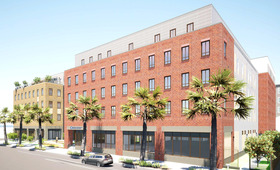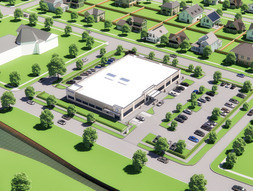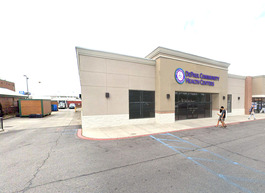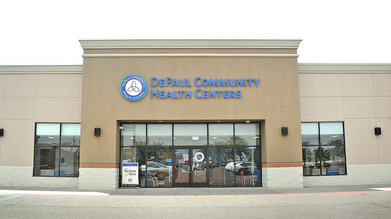
A platform that encourages healthy conversation, spiritual support, growth and fellowship

NOLACatholic Parenting Podcast
A natural progression of our weekly column in the Clarion Herald and blog

The best in Catholic news and inspiration - wherever you are!
Larger health centers increase DePaul’s local reach
-

By Christine Bordelon
Clarion Herald
DePaul Community Health Centers is investing $23 million in the local community with three new sites to replace smaller locations in New Orleans and on the West Bank. “The need has grown, and the (medical) practices (at each site) are full,” said Michael Griffin, president and CEO of DePaul Community Health Centers (DCHC). “With the model of care and services that we have implemented and designed, we needed more space” to serve more than 55,000 patients annually at 11 sites.
“The need has grown, and the (medical) practices (at each site) are full,” said Michael Griffin, president and CEO of DePaul Community Health Centers (DCHC). “With the model of care and services that we have implemented and designed, we needed more space” to serve more than 55,000 patients annually at 11 sites.The three new sites are designed by the international Page Southerland Architects and are being built by Donahue-Favret Contractors.
Griffin sees the expansion as a marathon, not a sprint, considering how all of New Orleans has been rebuilding since Hurricane Katrina. He’s seen the demand for a multitude of services offered at the centers – primary and preventive care, behavioral health, women’s health, Medicaid/Medicare enrollment assistance, etc. – jump over the years. Among the largest growth has been in dental and optometry services and community navigation and health care workers.
“Eighty percent of what impacts your health is food insecurity, housing insecurity, your financial and educational status, not healthcare,” Griffin said. “What leads to the problems? You need to manage blood pressure, your sugar levels … so you are healthier.”

Completion in next year
An April 6 ribbon-cutting ushered in the first site at 1629 Westbank Expwy. in Harvey. This $4.2 million, 9,400-square-foot location replaces a smaller existing center nearby, Griffin said.In May, ground will be broken on a new, 20,000-square-foot, $14.4 million facility on General de Gaulle Drive in Algiers, Griffin said. Here, an urgent care facility with walk-in services, extended hours and an X-ray facility will be integrated.
“Algiers doesn’t have many resources for health care, and it brings health care to our community,” Griffin said. “That’s what our mission has been.”
The third new facility at 1300 Oretha Castle Haley Boulevard in New Orleans is slated to open in December, Griffin said. It replaces a smaller, 2,000-square-foot site at 3600 Prytania Ave. in New Orleans. This new one will have approximately 9,000 square feet and cost $4.3 million to build on the ground floor of the new H3C facility that combines 200 low-income housing units and retail. It will have dedicated space for a lab, full pharmacy and behavioral health.

In fact, all three new sites will integrate a pharmacy, behavioral health and community rooms for education on such things as diabetes and have dedicated parking. These facilities bring together all kinds of providers – pharmacists, medical providers, community health managers, nurse care managers – to develop individual care management plans with clients.“That’s what we needed – more space to capitalize on, work with and educate patients,” Griffin said. “Adding pharmacies at each site is key to people getting and staying on medications … and making them more affordable. … The interaction between provider and pharmacist is integral.”
Long legacy in the area
The first DePaul Community Health Center was opened in 1996 on Carrollton and Washington avenues in New Orleans. (It was formerly known as Daughters of Charity Health Center, founded by the Daughters of Charity, who have served New Orleans for 185 years.) That site was destroyed by Hurricane Katrina, but the Daughters came back bigger and better.
Since that first site, the Daughters of Charity have opened 11 sites. A game changer has been the centers’ integration of health care education into each practice, along with giving providers more time with patients, adding online records and telehealth and working with community partners.
“People used to come and visit a provider, find out what’s going on and get a prescription,” Griffin said. The shift with electronic medical records and portals has increased the knowledge of the patient and allowed them to peruse their records and “increased communication between smart phones and iPads … increased communication with providers and other service partners. It gives us an opportunity to make a change.”
With telehealth, DePaul Community Health Centers has seen a decline in no-show rates for behavioral health and mental health visits, and there’s been increased compliance with patients keeping other appointments.
“We visit where they are … and that could be under a bridge,” if a person is homeless. “Now, we are able to get them on their cell phones.” With the e-platform, “we are learning how we can do more and personalize it for New Orleans.”
Griffin, who was recently honored as an affiliate member of the Daughters of Charity, among only 163 people with this distinction, said Hurricane Ida illustrated how invaluable telehealth is.
“People could continue their visits, and we could write prescriptions (and call them into a pharmacy where individuals had evacuated). The patients or providers could be in Atlanta or Birmingham. That has been a game changer.”
With community partners, DePaul Community Health Centers also connect clients with more services such housing and food opportunities.
Funding for the expansion has come primarily from Ascension Health – DePaul’s parent company – and fundraisers.
DePaul Community Health Centers accept Medicare, Medicaid, ACA and commercial health insurance. Visit depaulcommunityhealthcenters.org or call (504) 207-3060.




